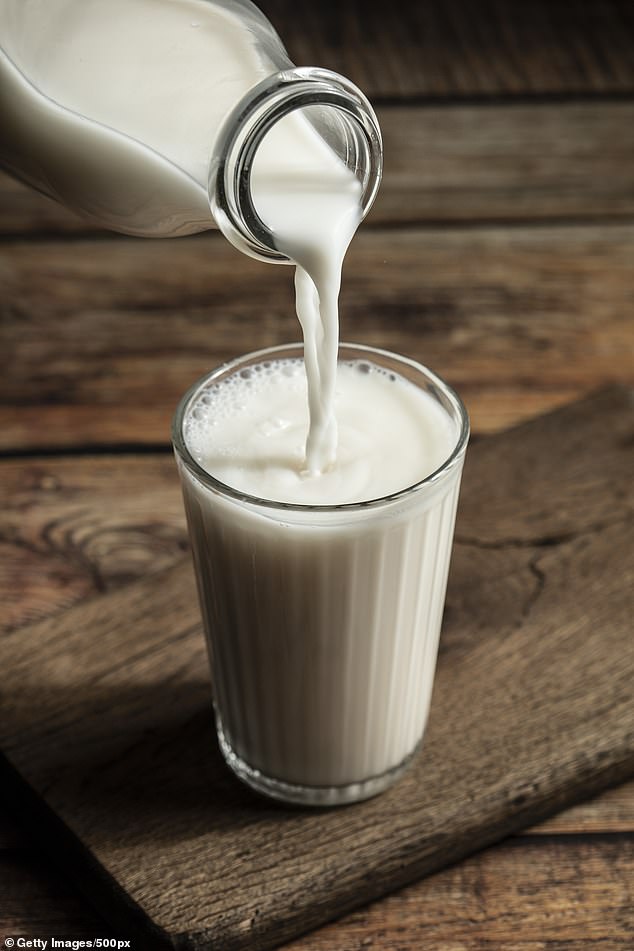Around one in four people experience heartburn from time to time – and while many presume medication is the only way to alleviate it, relief can be found using everyday items hiding in your kitchen cupboard.
This isn’t just the basis of old wives’ tales – these are approaches supported by science.
And these remedies maybe easily at hand in the fridge, the spice rack or even the sweet jar.
They may offer a helpful option as the typical burning sensation in the middle of the chest that heartburn causes often hits at night.
The pain occurs when stomach acid rises into your oesophagus – the pipe that carries food to the stomach.
Some may also experience burping, an unpleasant sour taste in the mouth caused by the regurgitation of stomach acid, a bloated stomach, nausea or abdominal pain.
While an occasional inconvenience for most, for around 9.5million people it’s a regular occurrence, referred to as gastro-oesophageal reflux disease (GORD).
The heartburn may be so painful that it can ‘sometimes being mistaken for heart attack pains’, says Dr Cameron Braddy-Green, a consultant gastroenterologist and general physician at Whipps Cross University Hospital in London and the private Nuffield Health at Barts Health NHS Trust.

Heartburn occurs when stomach acid rises into your oesophagus – the pipe that carries food to the stomach – and affects about 9.5million Britons
There isn’t always an obvious trigger for the symptoms, but being overweight can play a role as it puts pressure on the abdomen, pushing acid back up into the oesophagus, explains Dr Braddy-Green. This is also true of pregnancy, particularly in the later stages.
It may also be worsened by eating late, and rich foods can contribute as they are often high in fat, which slows digestion and can increase acid production.
Meanwhile, spicy foods which contain capsaicin – a chemical compound that makes food taste hot – can be a problem as this can irritate the oesophagus.
Heartburn can also be a side effect of anti-inflammatory medicines, such as ibuprofen, which can irritate the stomach lining.
Even stress is implicated. Studies have shown that the corticotropin-releasing hormone (CRH), which plays a key role in the body’s stress response and triggers the release of stress hormones such as cortisol, can increase the oesophagus’s sensitivity, making it more aware of smaller amounts of acid and, therefore, more prone to heartburn.
‘For those who have a history of GORD or who suffer from chronic reflux, proton pump inhibitors (PPIs, which switch off stomach acid production) such as omeprazole and lansoprazole, may be prescribed by your doctor,’ adds Dr Braddy-Green.
Meanwhile, for occasional heartburn, antacids such as Rennie can be of benefit as they help ‘neutralise the acid,’ he says.
‘Alginates such as Gaviscon also help by forming a gel-like barrier between the stomach and oesophagus – these help by preventing stomach acid from flowing back up.’
These are available over the counter as tablets or liquids, but if you suffer from the odd bout of heartburn and can’t get to the chemist or fancy a drug-free approach, then might a home remedy be worth a go? Dr Braddy-Green gives his verdict on some of the most popular ones…
Chewing gum
Chewing gum after a meal helps promote the production of saliva and not only neutralises any stomach acid but soothes an inflamed oesophagus, helping to wash acid back down into the tummy, explains Dr Braddy-Green.
A 2001 study in Alimentary Pharmacology & Therapeutics found that chewing gum for one hour after meals could help reduce acid exposure. Benefits come from the act of chewing, so any gum is worth trying – apart from peppermint gum. ‘This can relax the smooth muscle in the oesophagus and actually worsen the acid exposure,’ Dr Braddy Green.
Milk
A glass of milk may soothe heartburn as the calcium and magnesium within act as a temporary protective buffer to the acid in the stomach.
One 2017 study in Complementary Therapies In Medicine found milk’s antacid ability was actually comparable to both ENO (a popular antacid medication) and baking soda. Many chewable antacids are magnesium based – Rennie, for instance.
But Dr Braddy-Green suggests trying low or semi-skimmed instead of full-fat milk, which triggers the release of certain hormones that can slow the rate of stomach emptying, prolonging heartburn.
‘It also stimulates the stomach’s acid production due to its fat content being harder to digest,’ he adds.
Low-fat yoghurt will have the same soothing qualities as well as containing additional probiotics – the ‘good’ bacteria that may help with digestion.

A glass of milk may soothe heartburn as the calcium and magnesium within act as a protective buffer to stomach acid
Turmeric
Curcumin, the active compound of turmeric, may be as effective as omeprazole – a PPI medicine used to reduce stomach acid – according to some early research.
In a 2023 study at Chulalongkorn University Faculty of Medicine in Bangkok, published in BMJ Evidence-Based Medicine, researchers found that over a two-month period two 250mg capsules a day reduced symptoms as effectively as a standard 20mg omeprazole.
While supplements would provide more accurate amounts, a teaspoon of dried turmeric contains roughly 200mg of curcumin, according to the Food Standards Agency, but the amount can vary depending on the turmeric’s origin and quality.
The benefits of curcumin are thought to be down to its anti-inflammatory and anti-microbial properties which potentially protect the lining of the oesophagus from stomach acid damage.
‘This is certainly interesting but further studies need to be carried out before I’d suggest people actually try it,’ says Dr Braddy-Green.
Chamomile tea
A relaxing cup of chamomile, often used to promote a good night’s sleep, may also help with heartburn.
One theory is that it relaxes muscles, particularly the pylorus (a valve at the bottom of the stomach), allowing the stomach to empty quicker and reducing the chance of acid escaping back up the oesophagus.
Its calming effects may also help with stress, a known contributory factor.
Indeed chamomile’s benefits may be less to do with a direct effect on the stomach and ‘more to do with the calming and soothing effect from the warm water tea,’ says Dr Braddy-Green.
But avoid it if you have a known allergy or hypersensitivity to ragweed pollens, he adds, as chamomile shares similar proteins so could, potentially, trigger allergic reactions.
Aloe vera
A 2015 study in the Journal Of Traditional Chinese Medicine found that aloe vera (a succulent tropical plant) given in syrup form, at a dose of 10ml per day for a month, was as effective as conventional medicines such as omeprazole at reducing heartburn, food regurgitation, flatulence, belching and nausea.
‘While sounding impressive, the patients in this trial knew what they were taking so the results could well be a placebo effect,’ says Dr Braddy-Green, which makes the trial results ‘unreliable’.
‘It does, however, seem to have a positive effect on the process of repair and restoration of the mucosal lining, particularly in the gastrointestinal tract.’
He adds that aloe vera also has laxative properties – used long-term it can lead to diarrhoea, weight loss and other conditions due to fluid loss.
‘For this reason more research is needed before I’d recommended using it to treat heartburn.’
Ginger
A centuries-old heartburn remedy, a 2023 study published in Cureus Journal of Medical Science investigated the effect of a ginger supplement on symptoms and found that over four weeks those taking a 540mg dose before lunch and dinner had a significant improvement.
It’s thought to work by ‘increasing the speed and efficiency that food moves through the digestive tract, reducing the amount of acid the oesophagus is exposed to’, explains Dr Braddy-Green.
Anecdotally, steeping some slices of fresh ginger root in hot water and drinking as a tea could also be beneficial.
But it might not be for everyone, as some people find ginger actually causes stomach upset, makes them bloated and gassy – and can even worsen heartburn.

Dr Cameron Braddy-Green, a consultant gastroenterologist in London, warns that treating heartburn with baking soda can lead to ‘dehydration, seizures and kidney failure’
Liquorice root
Love it or hate it, liquorice root may help heartburn – but it’s best to consume deglycyrrhizinated liquorice (DGL), which has been stripped of glycyrrhizin, the compound that gives liquorice its sweet taste.
DGL, available as tablets or capsules, is said to have antioxidant and anti-inflammatory properties. It’s also believed to help increase the mucous coating of the oesophageal lining, protecting it against stomach acid.
A 2010 study in Evidence-Based Complementary and Alternative Medicine found 75mg of the herbal remedy GutGuard, which contains DGL, twice daily for 30 days improved heartburn symptoms.
DGL is favoured over liquorice itself which, when eaten in large quantities (around 2oz or 57g every day for several weeks), can cause high blood pressure, water retention and low potassium which can cause effects such as muscle weakness and abnormal heart rhythms.
However, Dr Braddy-Green says that deglycyrrhizated products can still contain some glycyrrhizin. And when compared with the safety profile of PPI, for example, it’s not worth taking. Enjoy the odd piece of liquorice, but don’t take it for your heartburn.
…And one to avoid: baking soda
It might be better known as a rising agent for cakes but dissolving half a teaspoon of baking soda, also known as sodium bicarbonate, in water is said to work in the same way as many over-the-counter antacids – by neutralising stomach acids.
‘However, off-the-shelf baking soda has a very high sodium (salt) content – between seven to eight times the amount of sodium and bicarbonate compared with say prescription sodium bicarbonate, which is given to patients with chronic kidney disease,’ says Dr Braddy-Green.
‘For this reason, it can cause serious complications and I’d avoid it completely. Used in excess it can cause the body to try to correct the salt balance by drawing water into the digestive system. This can lead to dehydration, seizures and kidney failure.’
In short, keep the baking soda for the baking.